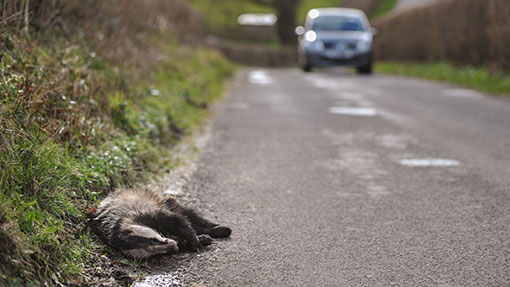Cheshire badger roadkill study shows 24% have TB

Research to test roadkill badgers to assess the level of bovine TB in Cheshire has found at least 20% are carrying the disease, according to interim results.
Out of 63 badgers collected for the study so far, 41 have been tested for TB, of which 10 have been confirmed as carrying the disease – equivalent to 24%.
In addition, some of the badgers that tested positive for the disease were picked up in the northern part of the county, rather than in southern or eastern areas bordering Shropshire or Derbyshire, where the disease is considered to be more prevalent.
The survey, which began March, aims to build up a picture of how prevalent bovine TB is in Cheshire, a county considered to be on the edge area of the disease.
See also: Latest news on bovine TB and the badger cull
Professor Malcolm Bennett, who is leading the University of Liverpool project, said: “We have isolated mycobacteria, almost certainly M bovis, from 10 carcasses, with at least one more likely to be positive.
“It is important to note these figures cannot yet be used to calculate the prevalence of infection, not least as the bacteria require 12 weeks culture before they can be confirmed as negative. However, is it clear the final prevalence will be at least 20%.”
Prof Bennett said the survey had returned surprising results, adding that the prevalence of the disease in the county – supposedly on the edge of infection – may be “much higher than previously thought”.
“The next step is to explain it and try to get some more money to carry out further research and widen the survey to other areas. All we can say at the moment is that there is a problem.”
Prof Bennett said the results of the remaining 20 or so badgers were still unknown and a few more badgers would be collected and tested before the project is wound up. Researchers aim to continue the study until the £10,000 funding runs out.
The study is the first for more than 10 years to try to establish the extent of bovine TB in Cheshire.
For the study, a team based at the university’s Leahurst veterinary campus has been receiving roadkill badgers from a small number of designated farmers, vets and wildlife groups in Cheshire.
Prof Bennett said only badgers submitted from trusted sources were being used in the survey, adding that any suggestions seen on social media of foul play were “absurd”.
The survey comes as the second year of the government’s badger culling trial in south-west England is due to get under way within weeks, while wildlife charities are expanding badger vaccination trials in some parts of the North West.
“The epidemiology of this disease is complicated and it involves a number of different species, in particular cattle and badgers,” said Prof Bennett, who is professor of epidemiology at Liverpool University’s Institute of Infection and Global Health.
“Unfortunately, there isn’t going to be one single ‘magic bullet’ control method, and getting on top of this disease will require different methods in different areas.”
Cheshire dairy farmer Richard Fair, who is also chairman of the Cheshire Bovine TB Eradication Group, has submitted two roadkill badgers for the survey.
He said the results cast doubt over whether the county was still in the edge area of the disease.
“If TB is already in the wildlife here, are we wasting valuable resources vaccinating badgers in Cheshire?” he asked.
“I don’t think that vaccinating badgers where we know there is an infection in the wildlife is a sensible use of the limited resources we have.”
Cheshire has experienced a year-on-year rise of bovine TB cases in livestock herds. Last year, there were 143 new cases of bovine TB in Cheshire, which led to the destruction of 829 cattle in the county.
But while the disease has established a strong presence in the south of the county, the region as a whole is considered by the government to be within the “edge area” of bTB progression northwards.
In the UK as a whole, 27,474 cattle were slaughtered due to bovine TB between January and October 2013.
